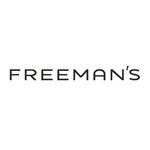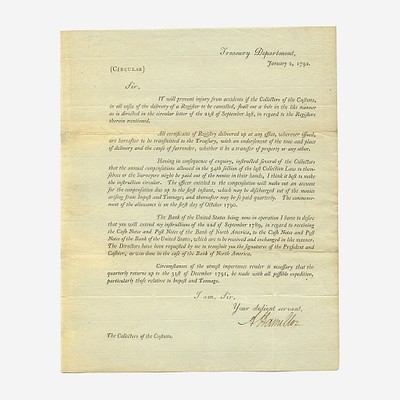[Hamilton, Alexander] [Treasury Department] Report of the Committee Appointed to Examine into the State of the Treasury Department Made to the House o
About Seller
2400 Market St
Philadelphia, PA 19147
United States
Established in 1805, Freeman’s Auction House holds tradition close, with a progressive mind-set towards marketing and promotion, along with access to a team of top experts in the auction business. And now with offices in New England, the Southeast, and on the West Coast, it has never been easier to ...Read more
Two ways to bid:
- Leave a max absentee bid and the platform will bid on your behalf up to your maximum bid during the live auction.
- Bid live during the auction and your bids will be submitted real-time to the auctioneer.
Bid Increments
| Price | Bid Increment |
|---|---|
| $0 | $25 |
| $500 | $50 |
| $1,000 | $100 |
| $2,000 | $200 |
| $3,000 | $250 |
| $5,000 | $500 |
| $10,000 | $1,000 |
| $20,000 | $2,000 |
| $30,000 | $2,500 |
| $50,000 | $5,000 |
| $100,000 | $10,000 |
About Auction
Oct 25, 2021
Freeman's is honored to present The Alexander Hamilton Collection of John E. Herzog, a single-owner sale of Alexander Hamilton material, on October 25. Curated by Darren Winston, Head of the Books and Manuscripts Department. Freeman's info@freemansauction.com
- Lot Description
[Hamilton, Alexander] [Treasury Department] Report of the Committee Appointed to Examine into the State of the Treasury Department Made to the House of Representatives of the United States on the 22d Day of May, 1794
Rare final report issued by the House Select Committee assembled to investigate Alexander Hamilton and the Treasury Department
"That it appears from the affidavits of the Cashier and several Officers of the Bank of the United States, and of several of the Directors, the Cashier and of the Officers of the Bank of New York, that the Secretary of the Treasury never has, either directly or indirectly, for himself or any other person, procured any discount or credit from either of the said Banks..."
Philadelphia: Printed by Francis Childs and John Swaine, 1794. First edition. 8vo. 86, (2) pp. MS. note on title-page recording 15 House Representatives and their states, who made up this select committee, being: Georgia: Abraham Baldwin (Anti-Administration), South Carolina: John Hunter (Anti-Administration), North Carolina: Joseph McDowell (Anti-Administration), Virginia: William B. Giles (Anti-Administration), Kentucky: Christopher Greenup (Anti-Administration), Maryland: George Dent (Pro-Administration), Delaware: Henry Latimer (Pro-Administration), Pennsylvania: William Irvine (Anti-Administration), New Jersey: John Beatty (Pro-Administration), New York: Philip Van Courtlandt (Anti-Administration), Connecticut: Zephaniah Swift (Pro-Administration), Vermont: Nathaniel Niles (Anti-Administration), New Hampshire: Paine Wingate (Pro-Administration), Rhode Island: Francis Malbone (Pro-Administration), Massachusetts: Peleg Coffin, Jr. (Pro-Administration). Original limp blue wrappers, front wrapper perished, original thread sound; all edges untrimmed; partially unopened; gathering H correcting imposed; wear to edges of text leaves; title-page worn, loss at center affecting some words of inscription; scattered spotting to text. Evans 27909; Ford, Bibliotheca Hamiltoniana 57; ESTC W29041
The 1792 Congressional elections saw the Democratic-Republicans capture majorities in the House that was to convene in December 1793 for the 3rd Congress. With their new majority, Republican lawmakers had the opportunity to continue the investigation against Alexander Hamilton that they had begun the previous winter, for what they viewed as his corrupt conduct in office. That previous winter, in an attempt to remove him from office, Thomas Jefferson and James Madison orchestrated a series of resolutions, submitted by Virginia congressman William B. Giles, seeking to uncover evidence of misuse of foreign loans by Hamilton (see lots 28, 29, 30). While these resolutions were eventually voted down by the Federalist majority and he was exonerated, Hamilton still believed his name had not been sufficiently cleared. By December 1793, Hamilton, recently recovered from a bout of yellow fever, and feeling increasingly harried by the crushing demands of his job as Secretary of the Treasury, was seeking an appropriate time to tender his resignation. With the prospect of further Congressional investigations on the horizon, he sought once and for all to clear his and his department's names and approached House Speaker Frederick Muhlenberg asking him to resume the investigations started by Giles. As Ron Chernow observes, "On February 24 (1794), the house assembled a select committee with sweeping powers to investigate the Treasury Department. Reflecting the new composition of Congress, the bulk of the committee was Republican. The members drew up an exhausting schedule to drain any energy Hamilton had left. Until their work was complete, they planned to meet every Tuesday and Thursday evening and Saturday morning. For three months, the committee stuck to this punitive schedule, and Hamilton testified at about half the sessions. Besides providing extensive official information, he had to disclose all of his private accounts with the Bank of the United States and the Bank of New York, as Republicans tried to prove that Hamilton had exploited his office to extort credits from the two banks." The committee found it hard to pin any grand misconduct on Hamilton so they reiterated their specific charge made the previous investigation that he mishandled foreign loans. Ultimately, citing verbal authority from President Washington to use the funds as he did, the committee completely exonerated Hamilton of any misdeeds. Vindicated, yet rattled, Hamilton went on to serve one more year before resigning in early 1795.
This rare final report from the committee to investigate Hamilton features a manuscript note, in an unknown hand, on the title-page listing the 15 members of Congress who served on the committee. The last two names, "Malbourne" and "Coffin" (Francis Malbone and Peleg Coffin, Jr.), appear to be in a different hand, possibly Alexander Hamilton's, and the final correction of "Mass" replacing "N.H." (New Hampshire), appears to be in yet another hand. The names of the members of the committee were printed in the Journal of the House of Representatives, printed at the end of 1794. We can locate only two other examples of this report ever being offered at auction, the last one over 100 years ago. Rare.
- Shipping Info
-
No lot may be removed from Freeman’s premises until the buyer has paid in full the purchase price therefor including Buyer’s Premium or has satisfied such terms that Freeman’s, in its sole discretion, shall require. Subject to the foregoing, all Property shall be paid for and removed by the buyer at his/ her expense within ten (10) days of sale and, if not so removed, may be sold by Freeman’s, or sent by Freeman’s to a third-party storage facility, at the sole risk and charge of the buyer(s), and Freeman’s may prohibit the buyer from participating, directly or indirectly, as a bidder or buyer in any future sale or sales. In addition to other remedies available to Freeman’s by law, Freeman’s reserves the right to impose a late charge of 1.5% per month of the total purchase price on any balance remaining ten (10) days after the day of sale. If Property is not removed by the buyer within ten (10) days, a handling charge of 2% of the total purchase price per month from the tenth day after the sale until removal by the buyer shall be payable to Freeman’s by the buyer. Freeman’s will not be responsible for any loss, damage, theft, or otherwise responsible for any goods left in Freeman’s possession after ten (10) days. If the foregoing conditions or any applicable provisions of law are not complied with, in addition to other remedies available to Freeman’s and the Consignor (including without limitation the right to hold the buyer(s) liable for the bid price) Freeman’s, at its option, may either cancel the sale, retaining as liquidated damages all payments made by the buyer(s), or resell the property. In such event, the buyer(s) shall remain liable for any deficiency in the original purchase price and will also be responsible for all costs, including warehousing, the expense of the ultimate sale, and Freeman’s commission at its regular rates together with all related and incidental charges, including legal fees. Payment is a precondition to removal. Payment shall be by cash, certified check or similar bank draft, or any other method approved by Freeman’s. Checks will not be deemed to constitute payment until cleared. Any exceptions must be made upon Freeman’s written approval of credit prior to sale. In addition, a defaulting buyer will be deemed to have granted and assigned to Freeman’s, a continuing security interest of first priority in any property or money of, or owing to such buyer in Freeman’ possession, and Freeman’s may retain and apply such property or money as collateral security for the obligations due to Freeman’s. Freeman’s shall have all of the rights accorded a secured party under the Pennsylvania Uniform Commercial Code.
-
- Buyer's Premium



 EUR
EUR CAD
CAD AUD
AUD GBP
GBP MXN
MXN HKD
HKD CNY
CNY MYR
MYR SEK
SEK SGD
SGD CHF
CHF THB
THB![[Hamilton, Alexander] [Treasury Department] Report of the Committee Appointed to Examine into the State of the Treasury Department Made to the House o](https://s1.img.bidsquare.com/item/l/9470/9470975.jpeg?t=1MwoET)
![[Hamilton, Alexander] [Treasury Department] Report of the Committee Appointed to Examine into the State of the Treasury Department Made to the House o](https://s1.img.bidsquare.com/item/s/9470/9470975.jpeg?t=1MwoET)










